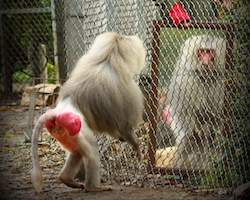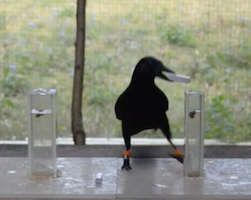How are humans different from other animals?
There are many similarities between humans and other animals that you may have noticed. Humans and animals both eat, sleep, think, and communicate. We are also similar in a lot of the ways our bodies work. But we also have a lot of differences. Are there any differences that set humans apart, uniquely, from all other animals?
Some people think that the main differences between humans other animal species is our ability of complex reasoning, our use of complex language, our ability to solve difficult problems, and introspection (this means describing your own thoughts and feelings). Others also feel that the ability for creativity or the feeling of joy or sorrow is uniquely human. Humans have a highly developed brain that allows us to do many of these things. But are these things uniquely human? First, let’s get into the fuzzy part of that question.

A baboon is being given a mirror test. Image by Moshe Blank via Wikimedia Commons.
There are a lot of things that humans think are true about animals and animal behavior, but some of these ideas are problematic. Sometimes, when we do tests on animal behavior, we use tests that apply to animals like humans, and we expect animals to perform in a similar way if they have similar abilities. For example, the mirror test is used to see if animals have awareness of themselves as the image that they see in a mirror. If a mark is placed on the animal, they should show signs of knowing that the mark is on their body. Maybe they try to rub it off with their hands or, if they can’t use their limbs that way, they may move their body a bit to see the mark better. But what if an animal doesn't have the best vision? Do we just say that, because they can't perform the test in that way, they wouldn't pass? Expecting all other animals to perform similarly to humans on tests can be problematic. This makes learning about some parts of animal behavior difficult.
But, what we have learned is pretty exciting. As we keep learning more and more about animal behavior, we are continually surprised.
Gunnison's prairie dogs seem to have a fairly complex language... rather than just sounding a basic alarm call, researchers have found that their alarm calls can describe specific predator speed, color, shape, and size... So when is this communication complex enough for us to call it a language? Elephants have been found to communicate across miles of land through subsonic sound. And when researchers slow a hummingbird's chirp down, it seems the song may be as complex as a song from some other birds, though more studies need to be done to understand this. Do we view animal "language" as limited just because we have trouble understanding it?

This Caledonian crow is solving a water level problem. It adds small blocks into columns of water to raise the water level, allowing it access to food. The crow also had to realize that one column was too wide, so the limited blocks wouldn't raise the water enough. Image from video by Logan C, Jelbert S, Breen A, Gray R, Taylor A via Wikimedia Commons.
Caledonian crows can solve problems and build tools, and can solve multiple-step puzzles that require a plan. Are these examples of difficult problems? Where do we draw the line to say something is "difficult" enough, or that we've given an animal proper motivation to want to even solve one of these problems?
Gorillas and chimpanzees have painted pictures of birds, describing (through sign language) that that is what they were trying to create. If they had a goal in mind and then made it, is that a sign that they had introspection? That they are describing their own thoughts? And that they are doing it by using their own creativity? Seems like it might be.
And animals do appear to feel joy and sorrow. There are videos out there showing a raven using a piece of plastic to sled down part of a snowy roof. The raven picks it up and slides down over and over again… they aren’t playing with another bird, they are enjoying sledding and having fun, perhaps feeling joy. And we continue to learn of more and more species that show sorrow, especially at the loss of members of their family or other loved ones. Animals that grieve include elephants, wolves, sea lions, magpies, and many more. A recent video of javelinas (peccaries that live in the American southwest) show that they mourn their dead. But we didn’t realize this, until it was captured by a field camera.
So maybe there isn’t that much that makes us uniquely human. Maybe we need to pay more attention to what animals are doing, and try to view the world through their eyes. And, perhaps our ability to consider other animals' feelings and hope for the well-being of these amazing creatures is our best, and most uniquely human ability.
Have a different answer or more to add to this one? Send it to us.
View Citation
Be Part of
Ask A Biologist
By volunteering, or simply sending us feedback on the site. Scientists, teachers, writers, illustrators, and translators are all important to the program. If you are interested in helping with the website we have a Volunteers page to get the process started.







